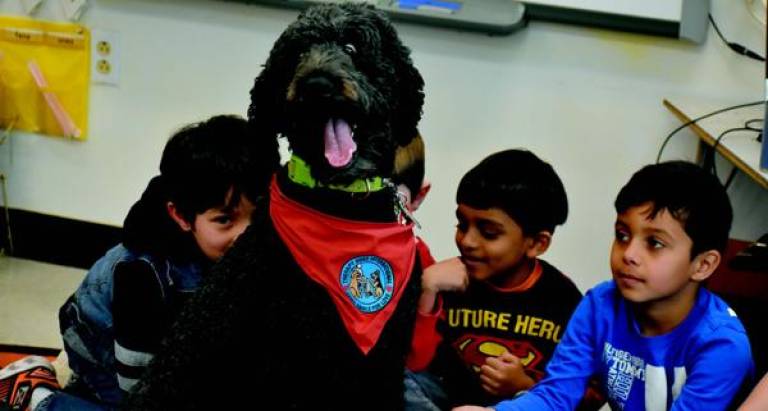Designed to be petted and loved

Rocket, a three-year-old black standard poodle, lolls on the carpet of a first grade classroom at Sapphire Elementary School, legs akimbo as he gets a belly rub. He's here in his official capacity as a therapy dog—not a bad gig from the looks of it.
He gets up to come give this visitor a sniff and a lick, takes a gander into the hallway, then lopes back into the middle of the knot of children. He puts both paws around the shoulders of his owner, Cliff Berchtold, and rubs noses.
Berchtold has been a familiar face around here forever. His first career was as transportation director for the Monroe-Woodbury School District. “I've always been service oriented, and a dog person,” he said. So when he retired, he thought, what about therapy dogs? “It was always so good for me to be around dogs,” he said. “I'm better around dogs than people.” He figured it would be good for the kids, too. Around his neck, Rocket wears a collar with a yellow tag that reads “I am a therapy dog” and a red bandanna with a patch from Therapy Dogs International. The first graders discuss a book they just read about the difference between service dogs and therapy dogs: the former is for helping people who have a disability; the latter is “to make people feel really happy,” said first-grader Avery Bellber.
Unlike service dogs, which you're not supposed to go up and touch, Rocket is “designed to be petted and loved,” said Berchtold. “I have a lot of children, they can't sit this year. They're very hyper,” said the teacher, Nikoleta Mylonas, who's been teaching for 30 years. This is the fi rst year that she's had a dog in the classroom, and she's a fan. “When he comes in they love it. It kind of cheers them up,” she said.
Berchtold says that Rocket seems to have an affinity for special education kids, like a nonverbal autistic student who shocked his teachers when he uttered the words “pet dog,” and a group of six elementary school boys with attention problems. “They came into the room like popcorn,” he said. They sat in a circle and put their hands on Rocket, not talking much. “Pretty soon the energy changed,” he said.
Ms. Mylonas' first graders pepper Berchtold with questions. How did Rocket win that award in a frame? (By completing 150 visits like these, including to hospitals and nursing homes.) When is Rocket's birthday, Anya Shahid wants to know.
That Anya is sitting here, in the knot of kids circling the dog, is a breakthrough. She wouldn't come near Rocket at fi rst. Berchtold has a method for dog-phobic kids (although he hasn't tried it on the woman in the front office who positions herself behind furniture when Rocket comes in). He invites them to get closer, and eventually to touch Rocket's back.
The class discusses how Anya was afraid, but she's better now. “She has willpower,” offers A'Jani Bellevue—another concept from yesterday's reading.
After saying 'bye to the first graders, Rocket heads downstairs (getting greeted in the stairway by name) to a kindergarten classroom. “Can I just smell him?” asks kindergartner Jacob Krulik, pressing his face into Rocket's ringlets. “He smells like ice cream pizza!” More little faces smoosh into Rocket's back, while Rocket's pink tongue curls into a yawn. Has there been pushback about taking time out of the packed school day? “I keep it fl exible,” said Berchtold. At the middle school, he lets Rocket run free in the hallways like just another middle schooler. He might go up and nuzzle a student organizing books at her locker. “Monday morning first thing in morning they're like the walking dead,” said Berchtold. “All of a sudden, snap, like electricity, they see the dog and everything lights up.”
Berchtold and Rocket stroll the middle school halls, waiting to be invited into classrooms, passing by the ones with closed doors. Once, Berchtold heard footsteps slapping the hallway behind them: a teacher had sent a runner to chase them down. Room 151 wanted their Rocket visit.